What's New
Displaying results 3121 - 3130 of 4052
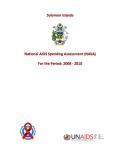
Resource | Publications,
In 2011, the Government of Solomon Islands committed to undertake a comprehensive National AIDS Spending Assessment (NASA) of HIV and AIDS expenditure in Solomon Islands.
This report is the result of a spending assessment exercise that was extensive, expansive and rigorous. It was coordinated by Solomon Islands National AIDS Commission (SINAC) in collaboration with UNAIDS and stakeholders involved in the response to HIV and AIDS.
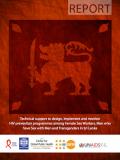
Resource | Publications,
This pilot project was the first of its kind in the country. It has brought different stakeholders together and used their strengths to develop a comprehensive response to HIV and AIDS. The capacities built locally will help in scaling up the interventions.
Overall, the project was successful in achieving most of its desired outcomes. It has provided some valuable lessons and learnings regarding the implementation of HIV and AIDS prevention programmes in the country. Learnings from the project needs to be incorporated in the next steps, to ensure that the programme increases its efficiency and effectiveness.

Resource | Publications,
Female sex workers (FSWs) are a population sub-group most affected by the HIV epidemic in India and elsewhere. Despite research and programmatic attention to FSWs, little is known regarding sex workers’ reproductive health and HIV risk in relation to their experiences of violence. This paper therefore aims to understand the linkages between violence and the reproductive health and HIV risks among a group of mobile FSWs in India.
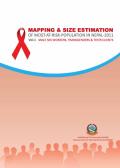
Resource | Publications,
This report presents the data and key findings emerging through the mapping and size estimation exercise of the male sex worker, transgender and their clients (MTCs). The mapping and size estimation exercise included the following three groups: male sex workers (MSWs), transgenders (TGs), men having sex with men (MSM) and clients of TGs and MSWs.
The specific aims of the mapping and size estimation exercise were firstly, developing comprehensive maps of MTC sites; secondly, estimating the size of MTCs at district and national levels; and thirdly, studying MTC behavioural and background characteristics.

Resource | Publications,
This report presents the data and key findings emerging through the mapping and size estimation exercise of the female sex workers (FSWs). FSWs in the mapping and size estimation exercise included the following groups: establishment-based FSWs, street-based FSWs and home-based FSWs.
The specific aims of the mapping and size estimation exercise were firstly, developing comprehensive maps of FSWs’ sites; secondly, estimating the size of FSWs at district and national levels; and thirdly, studying FSW behavioural and background characteristics.
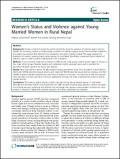
Resource | Publications,
Despite the increasing number of studies being conducted on violence against young married women elsewhere, this subject has received little attention from researchers and policy makers in Nepal. This paper assesses the prevalence of violence among young married women in rural Nepal. Specifically, it examines women’s status in order to better understand the risk of violence. A cross-sectional study was conducted in 2009 among 1,296 young married women aged 15-24 years in four major ethnic groups.
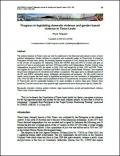
Resource | Publications,
The present situation in Timor Leste can only be understood in the historical and cultural context of prior political subjugations. Gender violence is a domestic and community reality in Timor-Leste. This paper gives an in-depth analysis of the domestic violence (DV) and sexual and gender-based violence (SGBV) outstanding issues, challenges, development and prospects. For the world's newest nation, much progress has been made in legislation promulgated since the restoration of independence in 2002. Now the need is for these various platforms of action to be pervasively socialised with all the citizens of Timor-Leste and for sustainable funding to be made available to achieve these goal. Despite these problems Timorese women have been granted legal empowerment and so been given hope for a better life.
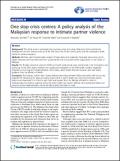
Resource | Publications,
This article aims to investigate the processes, actors and other influencing factors behind the development and the national scale-up of the One Stop Crisis Centre (OSCC) policy and the subsequent health model for violence-response. Methods used included policy analysis of legal, policy and regulatory framework documents, and indepth interviews with key informants from governmental and non-governmental organisations in two States of Malaysia. The findings show that women’s NGOs and health professionals were instrumental in the formulation and scaling-up of the OSCC policy.
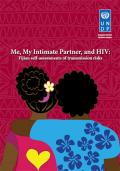
Resource | Publications,
This report is designed to strengthen Fiji’s response to HIV and AIDS. The aim of our study was to provide useful data about how Fijians think of and manage their risks of sexual transmission of HIV. We used multiple research methods and instruments to investigate the cultural, cognitive, and behavioral factors that shape HIV and STI transmission risks in Fiji. For the sake of brevity, we did not include here research protocols and instruments, letters of introduction and research clearance, statements of informed consent, and the like, but they can be obtained upon request to UNDP.
Fijians currently face a terrible dilemma without benefit of critical, open discussion of the individual and public health consequences of sexual ethics. Fijians can avoid infections by having sex that is better protected (by condoms), and perhaps even with a larger number of persons, with consent, communication, and mutuality of pleasure, or they can adhere to cultural and religious rules to have sex only with a legal spouse of the opposite sex but without condoms.
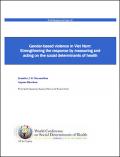
Resource | Publications,
Gender inequality impacts health in myriad ways, including "discriminatory feeding patterns, lack of
decision-making power, and unfair divisions of work, leisure, and possibilities of improving one's
life, in addition to limited access to health care services. One of the most significant consequences of gender inequality, however, is gender-based violence (GBV), including sexual violence, coercion, emotional and/or physical violence perpetrated by intimate partners and non-partners alike. GBV "reflects and reinforces inequality between men and women…[compromising] the health, dignity, security and autonomy" of its survivors.
This draft background paper is one of several in a series commissioned by the World Health Organization for the World Conference on Social Determinants of Health, held 19-21 October 2011, in Rio de Janeiro, Brazil. The goal of these papers is to highlight country experiences on implementing action on social determinants of health.





